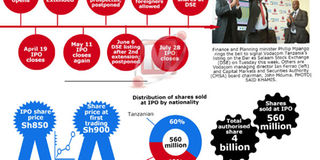How SA company bought 40pc shares in Voda IPO

What you need to know:
South Africa’s Public Investment Corporation (PIC), with about $100 billion in assets, now owns a 10 per cent stake in Vodacom Tanzania
Dar es Salaam. The South Africa’s Public Investment Corporation (PIC) is the foreign investor that bought 40 per cent of the shares that were issued for the Vodacom Initial Public Offering (IPO) after foreigners were allowed to participate. The firm came in as Vodacom was struggling to find buyers for all the 560 million shares issued in the IPO, necessitating the extension of the IPO in two occasions.
The South African government-owned investment company now owns 10 per cent of Vodacom Tanzania after buying 224 million shares worth over Sh190 billion.
Foreigners were allowed to participate in the IPO when it was extended for the second time on July 1, after local buyers failed to take up all the shares on offer and after the law was amended.
Over 41,000 Tanzanian investors – both retail and institutions - bought 60 per cent of the company’s 560 million shares offered and the remaining 40 per cent were all taken by PIC after the offer was extended the second time.
PIC is one of the largest investors in South African equities, with investments contributing towards approximately 12.5 per cent of the market capitalisation of Johannesburg Stock Exchange (JSE) Limited, according to information on its website. The 106 years old public investment firm has over $100 billion in assets.
Sources from the industry inform that the institution was interested in buying shares when the government announced to allow foreigners but later it decided to be the IPO underwriter.
Underwriter is an investment bank or institution that guarantees to purchase all unsubscribed shares after the IPO closes, at a fee.
“PIC is a very smart investor. Before buying, it first of all sent a team of experts for due diligence,” said the source.
According to the source, the institution wanted to be sure that the government was really committed to allowing foreign investors and confirm that Vodacom was a viable investment.
“The company even gave Vodacom conditions before it committed itself to taking all the remaining shares.”
Analysts also say the local subscription to Vodacom shares is a clear indication of liquidity shortage in the Tanzanian market.
“From that ownership structure, dividends and profits will still be transferred out of Tanzania and that diminishes the goal of empowering locals,” said economist Prof Honest Ngowi of Mzumbe University.
“Vodacom did a good job to market its shares and that is what it could achieve. So, I wouldn’t say there is little awareness about this,” he added.
But Zitto Kabwe, MP for Kigoma Urban (ACT) said in his Twitter handle that PIC’s participation in the IPO was “huge confidence to the Tanzanian Dar es Salaam Stock Exchange.”
He further said the aim of IPO’s is not generally to raise capital and not empower people as the government originally intended when it passed the Electronic and Postal Communications Act.
As far as the 60 per cent of the shares in the IPO that were taken by locals 94 per cent were taken up by institutional investors and only about 6 per cent were taken up by individual investors.
Mic Tanzania which trades as Tigo and Airtel Tanzania are also in the process of offloading their 25 per cent stake respectively to comply with the mandatory listing required by the Electronic and Postal Communications Act.
Vodacom IPO is so far the largest in Tanzania’s history. In 1998, Tanzania Breweries Limited (TBL) its IPO worth Sh122 billion and in 2008, NMB Bank floated its offer worth Sh63 billion.
CRDB was the third largest IPO worth Sh18.8 billion.
The Vodacom IPO has also increased the number of the capital market investors from about 470,000 to about 510,000 currently but the number is just around one per cent of Tanzanians estimated at 50 million, according to Dr John Mduma, the chairman of the Capital Markets and Securities Authority.




